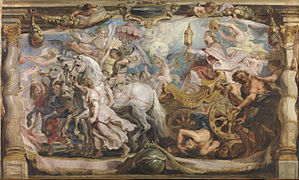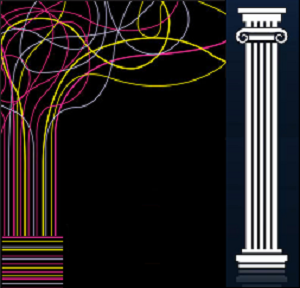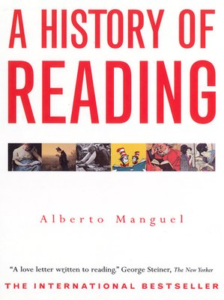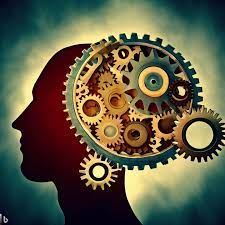
Arquivo para a ‘Linguagens’ Categoria
The light and the truth
There is a single and true light, although we know that light can unfold into various colors that we see from red to violent, and that we do not see as infrared and ultraviolet.
know that light can unfold into various colors that we see from red to violent, and that we do not see as infrared and ultraviolet.
We are increasingly getting closer to the idea that the beginning of the universe had something like light, today according to Standard Physics Theory, the photon was already theorized by Einstein as particles or small “packages” that transport the energy contained in electromagnetic radiation, photons at rest they have zero mass.
Thus, the light that emanates from the origin of the Universe, although not confused with its intention (to radiate light), is at the origin of all electromagnetic radiation from the Big Bang.
The Neoplatonists, like Plotinus (205 – 270), believed in monism and in this radiation of light, there is a one or a god (it was not the Christian God) from which emanates a divine source that radiates throughout all creation, in this one light that Augustine of Hippo will rely on denying the Manichaean dualism that he had previously believed in and from there his turn towards Christianity will take place.
Plotinus’ texts were compiled by his disciple Porphyry and written in the work the Six Enneads (actually nine parts, as ennea in Greek is 9), in which the question of the union of the soul and the intellect stands out, it is based on this idea that the Truth dwells in man.
Thus the soul of the world proceeds from a creative power (not from power, as it does not define it), contemplating the Nous and multiplying itself in all the particular beings of the sensible world, without dividing itself (this is the interpretation of Fritz- Peter Hager in his 1962 book).
The truth thus dwells in the soul and interior of each man, it is this interiority that some critics define as the idealism or intimacy of the Neoplatonists, but today there are several works on the issue of the Contemplative Vitta, Hannah Arendt and Byung Chul Han remember it, but other authors have already started to mention Barthes’ Rumor of the Language mentioned in the previous post.
For Christians, this manifestation of truth occurs ontologically in the Incarnation, Passion and death of Jesus, death because it is part of human life and should be lived as an “Easter” passage that opens eternal life to men, without this passage life fullness is not realized and we perish as matter, this aspect is also problematized by Plotinus.
In the photo, Peter Paul Rubens’ work on Saint Augustine’s Anti-Milleranism, which did not accept the literal reading of Revelation 20:1-10.
Plotinus, Enéadas, (2021) transl. by José Seabra Filho and Juvino Alves Maia Junior, Brazil: Editora Nova Acropole (volume 6 was published this year, completing the work).
Augustine, Saint. (1999). A cidade de Deus (The city of God), trans. Oscar Paes Leme. Brazil, Petrópolis, Editora Vozes.
Silence and the resistance of the spirit
War is noisy not only in weapons and bombs, but mainly in the chatter it generates in which it is impossible to have serenity, think and dialogue; the noisy aspect is a fundamental part of the insanity it represents.
bombs, but mainly in the chatter it generates in which it is impossible to have serenity, think and dialogue; the noisy aspect is a fundamental part of the insanity it represents.
The resistance of the spirit, we are following Edgar Morin’s line, is the possible “weapon” at this moment and perhaps in even worse futures, it means, in many moments, remaining silent, making a silence so profound that it questions the Other who does not give up on argue your reasons for war.
In the Plotinus philosophy, which deeply influenced Saint Augustine, although they are different thinkers, one Christian and the other just Stoic, silence is a stage of deep knowledge of reality, of the one, unity that encompasses everything without leaving itself.
For him when an aspirant to truth (which is truth in fact, not rational logic), he has to have the experience of unity, this experience is total and silent.
The Brazilian philosopher Giacóia Junior seeks in Espinoza’s quote to reflect on this perspective of the relationship between noise and silence when he states that “certainly the fate of humanity would be happier if it were equally within man’s power to both speak and remain silent. But experience teaches sufficiently and superabundantly that nothing is less in the power of men than their language (…) (cf. GIACOIA JUNIOR, 2014, P. 79).
To be faced with silence is to be faced with truth, and if language is the home of being, it is worth remembering that the Word became flesh (John 1:1) if it is not accepted in the biblical sense, it can be thought of as an ontogenic or Phylogenic, as Barthes states in his book The Rumor of Language, states that: “it is language that teaches the definition of man” and that it cannot be considered “a simple instrument, utilitarian or decorative, of thought. Man does not pre-exist language, neither phylogenetically nor ontogenetically” (BARTHES, 1988, p.185).
Thus truth is a Being, language is the dwelling of Being and silence is its apex.
BARTHES, R. 1998. O Rumor da língua (The Rumor of Language). Brazil, São Paulo: Brasiliense.
GIACOIA JUNIOR, O. (2014) Por mais horas silenciosas (For quieter hours”)in: NOVAES, Mutações. Brazil, São Paulo: Ed. SESC SP.
Truth and good works
There is no ontological truth where the unveiling of being does not occur, and this depends on its deeper realization in contact with its essence and must bear fruit for life, for personal and social well-being and for those who believe for an eternity.
of being does not occur, and this depends on its deeper realization in contact with its essence and must bear fruit for life, for personal and social well-being and for those who believe for an eternity.
Sophists in ancient times created truths that could even be logical, but the objective was to gain power and benefit from those who had wealth and influence, and this has not been eliminated from everyday life until today, a large part of politics is the negotiation of public goods, fraud and for this they use non-truth, and this is not the monopoly of one group.
There is no way to maintain this logic without authoritarianism, the restriction of freedom and silencing the voices of those who suffer from greed for power and wealth, a large part of the current crisis comes from these values, even if they blame the media, they are also under control of these powers.
The media follow the ontic logic in the ontological difference, we briefly develop this issue of the way Heidegger and other followers of the different ontological currents see it, in the scope of interpretation and dialogue the logic cannot be ontic, it must follow the ontological truth that follows from fusion of horizons in the hermeneutic circle (see previous post).
Dualism and polarization follow the ontic truth, blaming the media that do nothing that they do not have under control in some way, which could even be algorithms, man himself, thus the dual ontic logic used is instrumental and in a certain way sophistical because it aims the power.
On Sunday, Holy Week begins for Christians, the ontological truth that was manifested as being in the person of Jesus had to be destroyed by the discourse of power, even the religious power of the time that could not believe that truth is the logic of Being and man, when he manifested his good works, almost always confronted power.
It is necessary to go against the current to reverse the logic of ease, of easy money through corruption, of power for power’s sake and of disservice to society.
Ontological difference and hermeneutic circle
Before the concept developed by Hans George Gadamer, dialogue in Heidegger’s hermeneutic circle seemed to be built on idealist foundations, although it was not exactly this, as knowledge in hermeneutics does not occur through the revelation of the object to the subject, as was seen by Kant, nor is it a mere projection of the object onto the object, it is in fact an “appearance” in dogmatic basis.
George Gadamer, dialogue in Heidegger’s hermeneutic circle seemed to be built on idealist foundations, although it was not exactly this, as knowledge in hermeneutics does not occur through the revelation of the object to the subject, as was seen by Kant, nor is it a mere projection of the object onto the object, it is in fact an “appearance” in dogmatic basis.
Subject and object have their own horizons, the ontological difference explains them, although both are endowed with historicity, the ontic reality as explained in previous posts has a logical truth, in it there is a critique and overcoming of Husserl’s subjectivist (objectivist) phenomenology of transcendental, so idealism has already been overcome there.
Thus, Heidegger’s fundamental ontology gained prominence in the question of the meaning of being is posed as a privileged question, so the being of beings does not “is” in itself another being (Heidegger, 2002, p. 32), like Dasein ( being-there, pre-sentence) is the privileged being that understands being and has access to beings, it is part and essential condition of the human being.
Said by Heidegger: “this being that each of us is and that, among others, has in its being the possibility of questioning, we designate it with the term pre-sense.” (Heidegger, 2002, p. 33), but it is not subjective in the sense of being (entity), this Subject and object have their own horizons, the ontological difference explains them, although both are endowed with historicity, the ontic reality as explained in previous posts has a logical truth, in it there is a critique and overcoming of Husserl’s subjectivist (objectivist) phenomenology of transcendental, so idealism has already been overcome there.
Thus, Heidegger’s fundamental ontology gained prominence in the question of the meaning of being is posed as a privileged question, so the being of beings does not “is” in itself another being (Heidegger, 2002, p. 32), like Dasein ( being-there, pre-sentence) is the privileged being that understands being and has access to beings, it is part and essential condition of the human being.
Said by Heidegger: “this being that each of us is and that, among others, has in its being the possibility of questioning, we designate it with the term pre-sense.” (Heidegger, 2002, p. 33), but it is not subjective in the sense of being (entity), this The opening of being-there, that is, the being of this being-there is concern (cure, sorge), it is a light that gives clarity to presence, that is, that which makes it “open” and also “clear” For yourself.
It is the cure that founds every opening of the pre-sentence and the temporality that originally illuminates it. Heidegger states that only starting from the rooting of the pre-sentence in temporality is it possible to penetrate the existential possibility of the phenomenon, being-in-the-world, which, in the beginning from the analysis of presence, it became known as a fundamental constitution (HEIDEGGER, 2002, p. 150).
Gadamer, Hans-Georg. (2002) Truth and Method II: Complements and Index. Translated by Enio Paulo Giachini. Brazil, Petrópolis, 2002.
Heidegger, Martin. (2002) Being and Time: Part I, Translated by Marcia Sá Cavalcante Schuback. 12th ed. Brazil, Petrópolis: Vozes.
What contemporary ontology is not
Based on the works of social psychology,  where Franz Brentano worked on two categories of Thomism: consciousness and intention, modern phenomenology was derived from Husserl and then from Heidegger, a deviation towards an ontology called continental, from Nicolai Hartmann and with it a well-known doctrine emerged. as ontic structural realism (OSR).
where Franz Brentano worked on two categories of Thomism: consciousness and intention, modern phenomenology was derived from Husserl and then from Heidegger, a deviation towards an ontology called continental, from Nicolai Hartmann and with it a well-known doctrine emerged. as ontic structural realism (OSR).
What seemed like an unveiling, an appropriate term used by Heidegger to infer his clearing, becomes confusing again, because OSR not only gained prominence but was subdivided into three doctrines: OSR1, which is the view that relations are ontologically primitive, but objects and properties are not; OSR2, which is the view that objects and relations are ontologically primitive, but properties are not; OSR3, which is the view that properties and relations are ontologically primitive, but objects are not.
Central to Heidegger’s ontology, as we said in the previous post, is the notion of ontological difference: the difference between being as such and specific entities, the error of current philosophy is beyond forgetting being, understanding being as such as a kind of ultimate entity, for example, as “idea, energy, substance, monad or will to power”, the first linked to contemporary “natural” philosophy and the last two to the social and power vision.
This error even had to be rectified in its “fundamental ontology”, focusing on the meaning of being, a project similar to contemporary meta-ontology, read the works of Michael Inwood (fundamental ontology) and Peter Van Inwagen, ( meta-ontology).
And all this seems essentially theoretical, but it is not, we are discussing ontic things and non-things (Byung Chul Han has an essay) and strategies and logics of power, which forget being.
Nicolai Hartmann is a 20th century philosopher, although his perspective is “continental”, he clarifies that the relative modalities of the senses depend on the absolute modalities and proposes this reality on four levels: inanimate, biological, psychological and spiritual, which form a hierarchy, even though its development is excessively schematic, there is the question of being, from which contemporary man escapes and puts not only these levels in check, but civilization itself.
The forgetfulness of being is fundamental to understanding the lack of temper and the crisis of meaning in life that is present in all human spheres, from politics, education to the spiritual.
Inwood, Michael (1999). «Ontology and fundamental ontology» A Heidegger Dictionary. [S.l.]: Wiley-Blackwell
Inwagen, Peter Van (1998). «Meta-Ontology». Erkenntnis. 48 (2–3): 233-50, 1998.
Ladyman, J. (1998) What is structural realism? Studies in the History and Philosophy of Science.
The ontological truth
There is a difference between the logic that is based on purely human reason, and the ontological one based on the reality of Being and its existence, thus it is not a final truth, but an eschatological one, that is, it has a beginning and an end where existence is explained. .
In a purely philosophical way, ontic and ontological truth always refer differently, to the being in its being and to the being of the being, and the relationship between them is called ontological difference, little explored in philosophy and embedded in any theory that deals with of Being.
The relationship of latency between being and being and between presence and being makes it evident that the foundation of ontological difference is presence, according to Heidegger (pg. 102):
Unveiling of being is, however, always true of the being of the being, whether it is actually real or not. And vice versa, in the unveiling of beings there always lies an unveiling of their being. Ontic truth and ontological truth always refer, in different ways, to the being in its being and to the being of the being. They are essentially part of each other due to their relationship with the difference between being and being (ontological difference).
It is about unveiling because to reveal is to remove a layer of the veil, but finding another that equally covers the truth, human reason and science itself goes like this, based on Karl Popper’s falsifiability principle, he claims that the fact of a That an assertion can be shown to be false is one of the principles for establishing sound science.
There is a circular relationship between ontic truth and ontological truth resulting from this circular facticity of presence [which is one of Heidegger’s translations of Dasein] and this relates to beings understanding being, and relates to being understanding beings.
“With the differentiation, which is in itself clear, between ontic and ontological – ontic truth and ontological truth, we effectively have the different elements of a difference, but not the difference itself” (pg. .412), explicitly saying the relationship of things with beings, is different from the relationship between beings among themselves, there is an ontological truth that must be revealed for the relationship.
So, how do ontological and ontic truth, as well as ontological difference, contribute to showing the relational character of the self? Conflicts and relationships involve this Being that is relational, but its understanding seen as instrumental, reified or of interest is nothing.
Heidegger, M. (1984) Sobre a essência do fundamento. In: Heidegger: conferências e escritos filosóficos. Transl. de Ernildo Stein. Brazil. São Paulo: Abril Cultural (collection: Os Pensadores).
Affection and empathy heal wounds
Alberto Manguel is an Argentine writer well known in university circles, both due to his relationship with Jorge Luis Borges, whom he met as a teenager and read books to him, as well as as the author of several anthologies and novels, including a book that I highlight as mandatory is A history of reading, in the original A History of Reading (1996).
known in university circles, both due to his relationship with Jorge Luis Borges, whom he met as a teenager and read books to him, as well as as the author of several anthologies and novels, including a book that I highlight as mandatory is A history of reading, in the original A History of Reading (1996).
A man of the world, in 1971 he lived in Paris and London, in 1972 he returned to Argentina but as foreign editor of the Italian publisher Franco Maria Ricci, in 1976 he moved to Tahiti, in 1982, Alberto moved to Toronto, Canada, where he lived until 2000.
He didn’t stop there, he moved to the Poitou-Charentes region, in France, where he bought and renovated a medieval monastery with his current partner Craig Stephenson, one of the renovations carried out was to accommodate his library of 40 thousand books.
In 2020 he donated the entire library to the future Center for the Study of the History of Reading (CEHL), and started living in Lisbon and is a columnist for the Canadian magazine Geist.
One of his famous phrases is “the banal belief that time heals wounds is a mistake: we get used to them, which is not the same thing”, but his phrase about reading seems to be a strong influence of Borges for whom the library was a paradise, it is about reading:
“The love of reading is something that can be learned but not taught.
In the same way that no one can force us to fall in love, no one can force us to love a book.
These are things that occur for mysterious reasons, but I am convinced that there is a book that awaits each of us.
Somewhere in the library there is a page that was written just for us.”
The phrase is also his: “Reading is always an act of power. And it is one of the reasons why the reader is feared in almost all societies”, there are others of course, but for this I invite my reader to read: “A history of reading”.
Manguel, A. (1996) History of Reading. New York : Viking.
Between heights and human smallness
Before achieving air travel, now space travel, man delighted in the heights of the mountains, the dizzying landscapes of peaks, gorges and paths in the heights that could contemplate the houses, cities and vegetation in the distance.
man delighted in the heights of the mountains, the dizzying landscapes of peaks, gorges and paths in the heights that could contemplate the houses, cities and vegetation in the distance.
A text that talks about these sensations, and the beginning of Schopenhauer’s philosophy, was written by Rüdiger Safranski, author of renowned works on Heidegger and Nietzsche, who also wrote about the rebellious philosopher Arthur Schopenhauer in a work entitled: “Schopenhauer and the wildest years of philosophy” (Brazil, São Paulo: Geração Editorial, 2011).
In it the author tells of Schopenhauer’s experience at the age of 16 when he climbed Mount Pilatus (near Lucerne, Switzerland) in the company of a mountain guide, the text says: “I felt vertigo when I first saw that encompassing space that I understood what was in front of me… I realized that such a panorama, seen from the top of the mountain, was so extraordinary that it led me to expand all my previous concepts. It is so different from everything else that it becomes impossible to give a real description of its scope for those who have not had the opportunity to see it.”
The text continues: “All smaller objects simply disappear, only greatness can be understood as a whole. All things mix with each other; one no longer sees a smaller number of isolated objects, but an immense, colorful, brilliant image, on which the gaze lingers for a long time, full of pleasure”, our highlight.
Safranski’s sagacity in describing the philosopher is important to understand how he sees beauty and the world, he no longer sees “isolated objects”, but in the eyes we become only “the eyes” on an “immense, colorful and brilliant image”.
He tells of another strong experience, but this one more “human”, when on July 30, 1804, when the great journey was already approaching its end, he climbed the Scheekopp mountain (The Snow Peak), in Silesia, then German, but today in Poland. The very old photo above is from this region, in this region when climbing the mountain they had to stop for the night in a cabin on an intermediate plateau, at the foot of the highest peak of the mountain (it´s in the background).
He says about this experience “we entered a unique room full of drunken shepherds… Their animalistic heat was unbearable… it produced a burning heat”, says Safranski of the passage that “it was from here that Schopenhauer took his later metaphor of the porcupines that they pushed themselves against each other to defend themselves from the cold and fear”, Schopenhauer’s readers will understand the image that somehow permeates his speech.
There is merit in Schopenhauer for removing all idealism and romanticism from the philosophical and literary reading of his time, his vision of seeing objects “from above” made him escape from idealism, but his vision of men is pessimistic and the metaphor of hedgehogs demonstrates this.
On a frame in the hut where a book is attached to write down memories, is what was written by Schopenhauer: “Who can rise above the mountains and then remain silent?”
However, the discoveries of post-idealism, post-Enlightenment are that the Cosmos is larger and enigmatic.
Serenity and light
There is only light when there is serenity, although Heidegger’s text is not directly linked to his concept of “clearing”, it is indirectly linked, as it calls for reflection, pure thought, one that “meditates” and does not just act.
Heidegger’s text is not directly linked to his concept of “clearing”, it is indirectly linked, as it calls for reflection, pure thought, one that “meditates” and does not just act.
Heidegger clarifies that: “the rootedness (die Bodentändigkeit) of modern Man is threatened in his most intimate essence. Furthermore: the loss of rooting is not caused only by external circumstances and fatalities of fate, nor is it the effect of negligence and the superficial way of Men. The loss of rootedness comes from the spirit of the time in which we were all born” (p. 17), thus is the absence of this clearing.
The domination by ideal and “calculating” models leads to a greater commitment to the gears of reason, than the gears of being and human dignity, going beyond ethics which is deeply linked to the “ethos” of the way of being and the character.
This is not a pure Manichaeism, because this also led and still leads to social and political dualism, but one that excludes the other, the different and forgets their human dignity, we remember Eduardo Galeano’s speech about war and the evil it entails. closes (post).
The pure reasoning of the calculating gear leads to precise business calculations, company management and even certain educational logic, but they forget the foundations of human ethics: respect for life, sociability among everyone and care for the planet.
Evil is thus seen as the absence of light, the impossibility of a clearing that dignifies and shows the truth to men, and this is independent of any rational logic because it is in the diffuse human logic that unites the unequal and equalizes the different.
For Christians, it is fundamental to remember the principle of light that erases all darkness, like a small candle lit in the pitch black, the Christian clearing, thus moving away from error and discord (Jn 3:21): “But whoever acts according to the truth, approaches the light, so that it becomes clear that your actions are carried out in God” and there is nothing more divine than truth.
If Heidegger’s rootedness refers to his loss in the “spirit of the age”, the deeper rootedness is that which comes from human origin, be it anthropological or ontological.
Non-thought today
Heidegger’s text on Serenity, written in 1949 at a ceremony commemorating the centenary of Conradin Kreutzer’s death, in his hometown Meßkirch, which, as it was also Martin Heidegger’s hometown, was called to speak at the event, book This is part of your speech.
a ceremony commemorating the centenary of Conradin Kreutzer’s death, in his hometown Meßkirch, which, as it was also Martin Heidegger’s hometown, was called to speak at the event, book This is part of your speech.
The text of serenity reveals how much we are induced to a calculated thought that runs from opportunity to opportunity, it is fundamental to understand that what is attributed to the digital world, was already happening long before this, and is not restricted to the digital universe: “ this thought continues to be a calculation, even if it does not operate with numbers, nor does it use a calculating machine, nor devices for large calculations” (pg. 13), even long before the digital universe, he talks about it and says that it is not the one you’re talking about.
The dynamic that many attribute to the digital universe was already very present in modern man: “thought that calculates (rechnend Denken) never stops, never comes to meditate. The thought that calculates is not a thought that meditates (ein besinnliches Denken), it is not a thought that reflects (nachdenkt), it is not the meaning that reigns in everything that exists” (idem, pg. 13), that is, of the late 1940s and before modern computers.
It is worth translating the German words: ein besinnliches Denken (a contemplative thought) and nachdenkt (to think about) and das rechnend Denken (calculative thought).
Thus, for the philosopher there are two forms of thought: that which calculates and that which meditates, and it can be thought that the second does not perceive reality, “contributes nothing to carrying out praxis” (pg. 14), can lead to pure reflection, persistent meditation being “too “high” for common understanding” (idem).
The author says that the only correct thing is that the truth of a thought that meditates appears as little spontaneously as the thought that calculates, both require efforts.
The fact that contemporary man is linked to a way of thinking is because this is the current way in which thought was elaborated and trained, linked to rational and ideal logos.
However, he considers that each person can follow the paths of reflection within their limits and in their own way: “We do not, therefore, in any way need to elevate ourselves to the “higher regions” when we reflect. We just need to linger (verweilen) close to what is close and meditate on what is closest: what concerns each one of us, here and now; here, in this piece of homeland; now, in the present universal hour” (pg. 14).
Of course, Heidegger reflected on the celebration in his hometown, but this applies to all the events we experience in our lives.
Heidegger, M. (no date) Serenidade (Serenity). Transl. de Maria Madalena Andrade e Olga Santos. Lisboa: Instituto Piaget, s/d.

